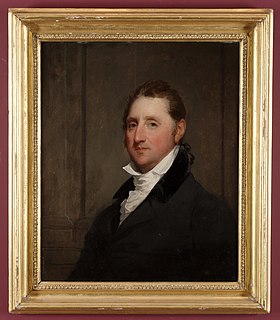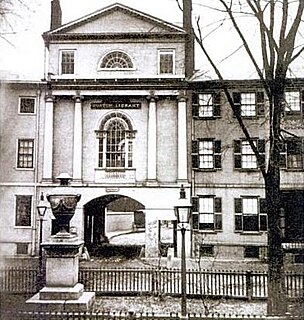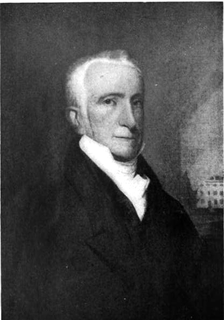Related Research Articles

Salem is a historic coastal city in Essex County, Massachusetts, located in the North Shore region. Continuous settlement by Europeans began in 1626 with English colonists. Salem would become one of the most significant seaports trading commodities and slaves in early American history.

The Boston Brahmins or Boston elite are members of Boston's traditional upper class. They are often associated with Harvard University; Anglicanism; upper-class clubs such as the Somerset in Boston, the Knickerbocker in New York City, the Metropolitan in Washington, D.C., and the Pacific-Union Club in San Francisco; and traditional Anglo-American customs and clothing. Descendants of the earliest English colonists are typically considered to be the most representative of the Boston Brahmins. They are considered White Anglo-Saxon Protestants (WASPs).
The Cabot family was part of the Boston Brahmin, also known as the "first families of Boston".

Colonel Thomas Handasyd Perkins, also known as T. H. Perkins, was an American merchant, slave trader, smuggler and philanthropist from a wealthy Boston Brahmin family. Starting with bequests from his grandfather and father-in-law, he amassed a huge fortune. As a young man, he traded slaves in Saint-Domingue, worked as a maritime fur trader trading furs from the American Northwest to China, and then turned to smuggling Turkish opium into China. His philanthropic contributions include the Perkins School for the Blind, renamed in his honor; the Boston Museum of Fine Arts; McLean Hospital; along with having a hand in founding the Massachusetts General Hospital.

Elias Hasket Derby was a Colonial American merchant and owner of a fleet of privateers. It took over 150 prizes during the American Revolution, and his large, swift Grand Turk was the first New England vessel to trade directly with China, making him not only one of the wealthiest and most celebrated traders of post-Revolutionary in Salem, Massachusetts, but at one point the richest man in the United States.
Gayton Pickman Osgood was a member of the United States House of Representatives from state Massachusetts. He was born in Salem on July 4, 1797. He graduated from Harvard University in 1815, studied law, was admitted to the bar and commenced practice in Salem. He moved to North Andover. Osgood served as a member of the Massachusetts House of Representatives, and was elected as a Jacksonian to the Twenty-third Congress. He was an unsuccessful candidate for renomination in 1834. He retired from public life and engaged in agricultural pursuits. Osgood died in Andover on June 26, 1861. His interment was in the Old North Parish Burying Ground.

Benjamin Pickman Jr. was a U.S. Representative from Massachusetts.

The East India Marine Society of Salem, Massachusetts, United States, was "composed of persons who have actually navigated the seas beyond the Cape of Good Hope or Cape Horn, as masters or supercargoes of vessels belonging to Salem." It functioned as a charitable and educational organization, and maintained a library and museum. It flourished especially in the 1800s–1830s, a heyday of foreign trade.

Dudley Leavitt Pickman (1779–1846) was a Salem, Massachusetts, merchant who built one of the great Salem trading firms during the seaport's ascendancy as a trading power in the late eighteenth and early nineteenth centuries. Pickman was a partner in the firm Devereux, Pickman & Silsbee and a state senator. Among the wealthiest Salem merchants of his day, Pickman used his own clipper ships to trade with the Far East in an array of goods ranging from indigo and coffee to pepper and spices, and was one of the state's earliest financiers, backing everything from cotton and woolen mills to railroads to water-generated power plants. Pickman also helped found what is today's Peabody Essex Museum.

The Quincy family was a prominent political family in Massachusetts from the mid-17th century through to the early 20th century. It is connected to the Adams political family through Abigail Adams.

The Boston Library Society was an American subscription library established in New England's pre-eminent city, Boston, during 1792. Early subscribers included Revolutionary War figures Paul Revere and William Tudor. The society existed until 1939 when it merged into a larger historical library known as the Boston Athenæum.

The Salem Athenaeum, founded in 1810, is one of the oldest membership libraries in the United States. The Athenaeum is located at 337 Essex Street in Salem, Massachusetts in the McIntire Historic District.

Gardiner Greene (1753–1832) was a cotton planter and merchant from Boston, Massachusetts who conducted business from his plantation, Greenfield, in Demerara (Guyana) in the late 18th and early 19th centuries. Socially prominent in the town of Boston, he owned a house, greenhouse, and garden filled with fruit trees and peacocks on Cotton Hill, opposite Scollay Square. He was also the son-in-law of painter John Singleton Copley.
The Portland Library Society (1763–1826) or Portland Library was a subscription library in Portland, Maine. The library "was originally established in 1763. It was revived in 1786, and re-established in 1806." Samuel Freeman served as librarian ca.1785-1807; followed by Oliver Bray (ca.1812-1817). New members were elected. The annual fee for each member was "two dollars per year in 1784 and fifteen dollars by 1801."
The Essex County Natural History Society (1833–1848) in Salem, Massachusetts, was formed "for the purpose of promoting the science of natural history." It endeavored "to form a complete collection of natural productions, curiosities. &c, particularly of this county; and, to form a library of standard books on the natural sciences." The society incorporated in 1836; Andrew Nichols, William Oakes, and William Prescott served as signatories. Other members included Samuel B. Buttrick, Samuel P. Fowler, John M. Ives, John C. Lee, George Osgood, Charles G. Page, Gardner B. Perry, George Dean Phippen, William P. Richardson, John Lewis Russell, Henry Wheatland. By 1836 some 100 members belonged to the society. In Salem its "cabinets and library were first deposited in Essex Place, then in Franklin Building, then in Chase's Building, Washington Street, and finally removed to Pickman Place, in 1842." In 1848 the society merged with the Essex Historical Society to form the Essex Institute.
The Salem Philosophical Library (1781–1810) or Philosophical Library Company was a proprietary library in Salem, Massachusetts. Men affiliated with the library included: Tho. Bancroft, Thomas Barnard, William Bentley, Joseph Blaney, Nathaniel Bowditch, Manasseh Cutler, Nathan Dane, Joshua Fisher, Edward Augustus Holyoke, Joseph Mc'keen, B. Lynde Oliver, Joseph Orne, William Prescott, Samuel Page, Joshua Plummer, John Prince, Nathan Read, John D. Treadwell, Ichabod Tucker, and Joseph Willard. "The Library was kept at the house of Rev. Joseph Willard of Beverly, till ... December, 1781. ... His successor was Rev. Dr. Prince, who had the volumes at his mansion" in Salem. "By 1810, many of the members of the [Salem] Social Library also belonged to the Philosophical Library, and the two bodies were merged to create the Salem Athenaeum."
This is a timeline of the history of the city of Salem, Massachusetts, United States.
The following is a timeline of the history of Lynn, Massachusetts, USA.
References
- ↑ James Raven. London booksellers and American customers: transatlantic literary community and the Charleston Library Society, 1748-1811. Univ of South Carolina Press, 2002
- 1 2 3 Library Journal, April 1910
- ↑ An Act for incorporating certain Persons by the Name of The Proprietors of the Social Library in Salem, February 7, 1797. Private and special statutes of the commonwealth of Massachusetts, Volume 2. Printed for the state, by Manning & Loring, 1805
- ↑ Plummer Hall: its libraries, its collections, its historical associations, Salem, Mass.: Salem Athenaeum], 1882, OCLC 13736607, OL 7000156M
- 1 2 3 4 5 6 7 8 9 10 11 12 13 14 15 16 17 18 19 20 21 22 23 24 25 26 27 H. Wheatland. Sketch of the Social and Philosophical Libraries. Proceedings of the Essex Institute, 1857